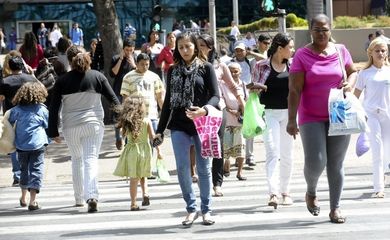In Brazil, women work 7.5 hours more than men

Women work, on average, 7.5 hours per week more than men because of the double burden—domestic chores and paid work. Although they have a higher education schooling rate, they also work more hours.

Data were pointed out by the study on gender and race inequalities, released today (Mar. 6) by the Institute for Applied Economic Research (IPEA). The study is based on historical series from 1995 to 2015 of the National Household Sampling Survey (PNAD) of the Brazilian Institute of Geography and Statistics.
In 2015, a typical woman worked on average 53.6 hours per week, while a typical man worked 46.1 hours. Concerning unpaid activities, the ratio remained almost unchanged for the last 20 years: more than 90% of women reported that they to carry out domestic chores; while only around 50% of men declared to do so.
"Women's responsibility for household chores continues to prevent many women from entering the labor market. Meanwhile, those who entered the market continue to be responsible for the household tasks and chores. Thus, we have a double burden," said the specialist in public policies and governmental management, who is also one of the authors of the survey, Natália Fontoura.
She explained that the rate of women's participation in the labor market has massively increased between the 1960s and the 1980s, but it has stabilized in the last 20 years. "It seems that women have reached their maximum of entry into the labor market. They could not surpass 60%, which is considered a low level compared with many countries," she said.
Heads of household
The study also noted that the number of women heading households has increased. In 1995, 23% of households were headed by women. Twenty years later, this rate reached 40%.
Female-headed households are not exclusively those in which there is no man: in 34% of them there were also husbands in the house. "Often, such families face greater risk of social vulnerability, as the average income of women, especially black women, remains much lower than men's income and white women's income," reported the survey.
Black women
IPEA noted that inequalities overlap concerning black women in the labor market. According to Natália Fontoura, despite important changes like general income increase of the employed population, the wage hierarchy—white men, white women, black men, black women—is still established.
"The disadvantage of black women is very severe in many indicators, in the labor market in particular, but also for heads of households and poverty. Here we have a moment in which gender and racial inequalities overlap in our country," said the researcher, noting that black women's illiteracy rate is more than double the white women's rate. Among men, this difference is similar.
Education
According to IPEA, in recent years, more Brazilian men and women have reached the higher education. Between 1995 and 2015, black adults aged 12 years or older increased from 3.3% to 12%. However, the level reached by black adults in 2015 was the same reported by white people back in 1995. White adults with higher education have nearly doubled in 20 years, increasing from 12.5% to 25.9%.
Translated by Amarílis Anchieta
Fonte: In Brazil, women work 7.5 hours more than men




